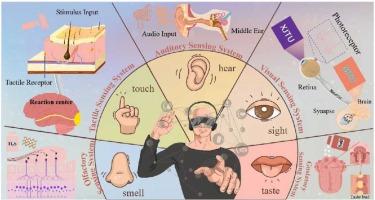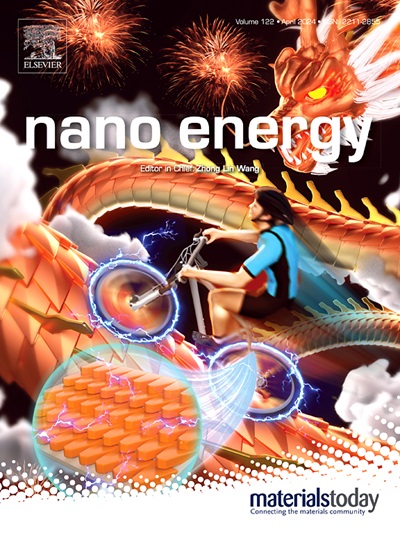An innovative biomimetic technology: Memristors mimic human sensation
IF 16.8
1区 材料科学
Q1 CHEMISTRY, PHYSICAL
引用次数: 0
Abstract
As a device with tunable resistance states, the memristor has demonstrated significant potential in emulating the plasticity of biosynapses. In recent years, the application of memristors in biomimetic sensory systems has gained widespread attention. This work reviews the research progress of memristors in simulating human senses, particularly in systems involving vision, touch, smell, and hearing. Memristors can not only simulate the perception, storage, and processing of various sensory signals, but also it can integrate with neuromorphic computing and self-learning algorithms to construct multimodal sensory systems. These systems, by integrating information from different sensory channels, can perceive the external environment more intelligently and have wide application prospects in many fields, such as robotics, smart healthcare, neural prosthetics, and augmented reality. Although current research on memristor-based sensory systems faces challenges such as manufacturing variability, randomness in conduction mechanisms, and power consumption during high-frequency operation, continuous developments in materials, structural design, and algorithm optimization are expected to lead to breakthroughs in the future. This work will facilitate the transition of memristor-based sensory systems from laboratory research to real-world applications, driving innovation and progress in biomimetic sensory systems and neuromorphic computing.

一种创新的仿生技术:忆阻器模仿人类的感觉
作为一种具有可调电阻状态的器件,忆阻器在模拟生物突触的可塑性方面显示出了巨大的潜力。近年来,忆阻器在仿生感觉系统中的应用得到了广泛的关注。本文综述了记忆电阻器在模拟人类感官方面的研究进展,特别是在涉及视觉、触觉、嗅觉和听觉的系统中。记忆电阻器不仅可以模拟各种感觉信号的感知、存储和处理,还可以与神经形态计算和自学习算法相结合,构建多模态感觉系统。这些系统通过整合来自不同感官通道的信息,能够更加智能地感知外部环境,在机器人、智能医疗、神经修复、增强现实等领域具有广泛的应用前景。尽管目前基于忆阻器的传感系统的研究面临着制造可变性、传导机制随机性和高频工作功耗等挑战,但材料、结构设计和算法优化方面的不断发展有望在未来取得突破。这项工作将促进基于忆阻器的感觉系统从实验室研究到现实应用的过渡,推动仿生感觉系统和神经形态计算的创新和进步。
本文章由计算机程序翻译,如有差异,请以英文原文为准。
求助全文
约1分钟内获得全文
求助全文
来源期刊

Nano Energy
CHEMISTRY, PHYSICAL-NANOSCIENCE & NANOTECHNOLOGY
CiteScore
30.30
自引率
7.40%
发文量
1207
审稿时长
23 days
期刊介绍:
Nano Energy is a multidisciplinary, rapid-publication forum of original peer-reviewed contributions on the science and engineering of nanomaterials and nanodevices used in all forms of energy harvesting, conversion, storage, utilization and policy. Through its mixture of articles, reviews, communications, research news, and information on key developments, Nano Energy provides a comprehensive coverage of this exciting and dynamic field which joins nanoscience and nanotechnology with energy science. The journal is relevant to all those who are interested in nanomaterials solutions to the energy problem.
Nano Energy publishes original experimental and theoretical research on all aspects of energy-related research which utilizes nanomaterials and nanotechnology. Manuscripts of four types are considered: review articles which inform readers of the latest research and advances in energy science; rapid communications which feature exciting research breakthroughs in the field; full-length articles which report comprehensive research developments; and news and opinions which comment on topical issues or express views on the developments in related fields.
 求助内容:
求助内容: 应助结果提醒方式:
应助结果提醒方式:


